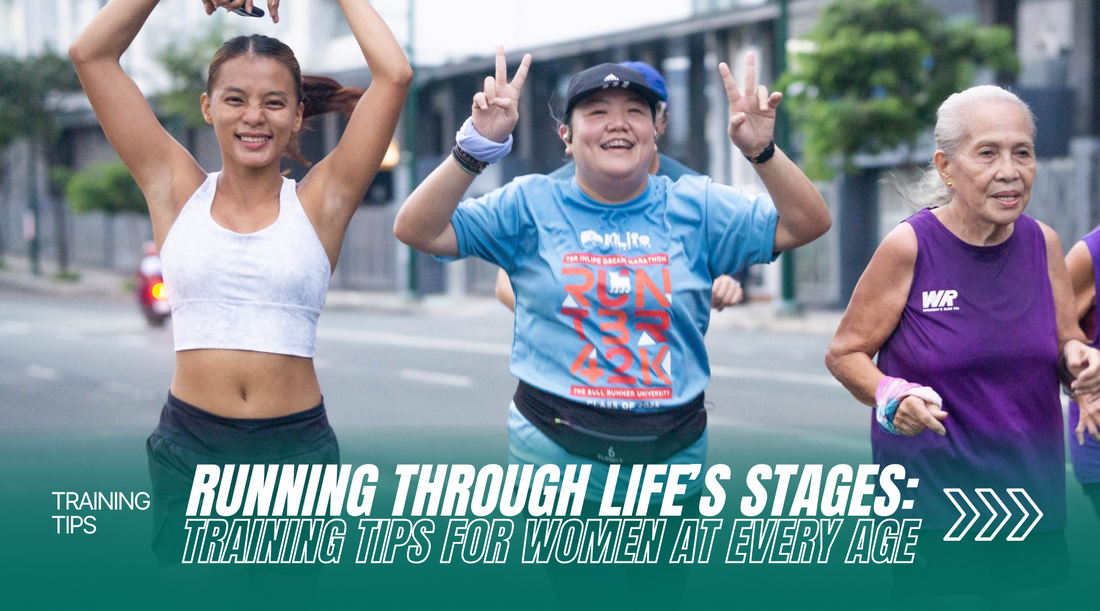
Running Through Life’s Stages: Training Tips for Women at Every Age
Share
Running is a lifelong journey, but as women move through different life stages, their training needs and goals evolve. Whether you're navigating pregnancy, postpartum recovery, or menopause, adjusting your approach to running can help you stay active, strong, and injury-free. Here’s how women can adapt their running routines at every phase of life.
Running in Your 20s: Building Strength and Speed
Your 20s are a time to build endurance, speed, and a solid running foundation. This is when your body recovers quickly, allowing for higher mileage and intense workouts.
Training Tips:
- Incorporate speed workouts like interval training and tempo runs to improve pace.
- Strength training is key. Focus on core, glutes, and leg muscles to prevent injury.
- Prioritize rest days to avoid overuse injuries.
- Fuel your runs with balanced nutrition, emphasizing protein and healthy carbs.

![]() Running in Your 30s: Balancing Performance and Life
Running in Your 30s: Balancing Performance and Life
With careers, family, and responsibilities increasing, consistency and efficiency become crucial in your 30s.
Training Tips:
- Time-efficient workouts like HIIT runs and hill sprints help maximize training.
- Prioritize mobility and stretching to prevent injuries as recovery slows slightly.
- Focus on proper hydration and nutrition to sustain energy levels.
- Cross-training with yoga or strength work can enhance endurance.
Running During Pregnancy: Moving Safely
Pregnancy doesn't mean you have to stop running, but modifications are necessary. Always consult your doctor before continuing or starting a running routine.
Training Tips:
- Listen to your body—slow down, reduce intensity, and avoid overheating.
- Switch to lower-impact runs or brisk walks if necessary.
- Support your changing body with a belly band and well-cushioned shoes.
- Hydrate well and avoid running in extreme heat.
 Image from Runners' World
Image from Runners' World
Postpartum Running: Easing Back Gradually
Your body needs time to recover after childbirth, so patience is key when resuming running.
Training Tips:
- Wait for medical clearance before returning to running (typically 6-12 weeks postpartum).
- Focus on rebuilding core and pelvic floor strength before high-impact workouts.
- Start with short, easy runs and gradually increase distance.
- Prioritize sleep and recovery as your body adjusts to new demands.
Running in Your 40s & 50s: Maintaining Strength and Endurance
Metabolism slows, muscle mass declines, and recovery takes longer, but staying active helps counteract these effects.
Training Tips:
- Strength training is crucial for maintaining muscle and preventing bone density loss.
- Recovery becomes more important.Prioritize sleep, hydration, and nutrition.
- Switch up workouts with cross-training to avoid repetitive strain injuries.
- Listen to your body and adjust mileage or intensity as needed.
Running Through Menopause: Adapting to Changes
Hormonal shifts during menopause can impact energy, endurance, and injury risk. Adjusting your routine can keep running enjoyable and sustainable.
Training Tips:
- Warm-ups and cool-downs become more critical to prevent stiffness and injuries.
- Include strength training to combat muscle loss and improve bone health.
- Pay attention to hydration and electrolyte balance, as hot flashes and sweating may increase.
- Shorten intense workouts and add more recovery days if needed.
No matter what stage of life you're in, running can be a powerful tool for strength, resilience, and mental well-being. By adapting your training to your body’s needs, you can continue running strong for years to come.
Here at WeKenRun, running knows no age - or gender! Join us through our Focused Training and be a part of our team today.
